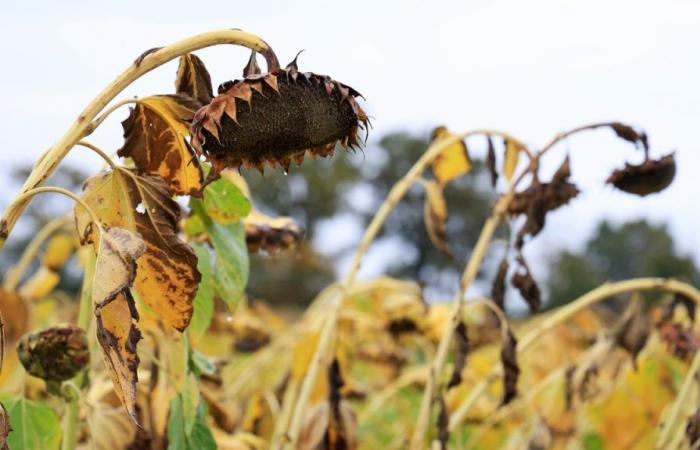“I’ve never seen that… Neither did the elders, for that matter. » Multi-cultivator-breeder in Boischaut-Sud since 2009 where he manages the Gaec des Mitatis with his wife, Benjamin Fauduet, 36 years old, is in despair about his sunflower harvest this year 2024: “Apart from a few days of respite at the beginning of August, we have never experienced such a long wet period…” Moreover, of the hundred hectares of crops he has, he has only sown a third. For a disastrous result: “We had planted 40 ha of sunflowers in Chasseneuil around April 20, so not very late… But they received 100 mm of rain in the week that followed! »
“Drowned by water or eaten by slugs…”
Result : “We lost 20 ha of it, drowned by water or eaten by slugs… We couldn’t even enter the plot to put anti-slug spray on it! » And the weather conditions since the beginning of September have only made things worse: “The sunflowers never stop ripening and excess water undermines the bearing capacity and structure of the soil. »
We worked for nothing… and even worse, with negative gross margins per hectare!
Benjamin Fauduet farmer in Boischaut-Sud
The shortfall will therefore be enormous for the farmer this year: “We worked for nothing… and even worse, with negative gross margins per hectare! We will be missing around €30,000 to €40,000 compared to a normal year, out of €250,000 – €300,000 in turnover overall, knowing that we have €100,000 in loans to repay every year, plus fixed charges… For crops, we will have a turnover of €35,000 instead of €100,000 – 110,000. Fortunately we have the cows, because another year like this, we won’t recover! »
Benjamin Fauduet’s tractor and harvester have difficulty moving through his sunflower plots and leave big ruts, the soil being waterlogged.
© (photo Benjamin Fauduet)
On the yield side, they too are “catastrophic” for Maguelonne de Sèze, a farmer in Ségry, who reports harvests which, for some, “when they could have taken place”rise “less than 10 quintals per hectare”when a satisfactory average is located “around 25 to 30 quintals per hectare”.
Sowing two months late
Same sad observation in Boischaut-Nord at Robin Doubli, who planted 17 ha of sunflowers in several plots around his farm in Pellevoisin: “The weather conditions mean that most of them are not yet ripe, because they were sown two months late this year, in June instead of April. There are some who are approaching maturity; others that were sown very late. »
The appearance of its sunflowers is therefore “quite heterogeneous” : “The first ones that I sowed suffered the heavy rains of the summer, runoff, a lot of beating (1) and slugs, wind which laid them down… At the beginning we had rather fields with few plants, but large heads of sunflowers, and the last one sown in the sands is really very beautiful with very successful sunflowers. »
Huge drying costs
Issue : “We don’t yet know if we will be able to harvest them… There was a ray of sunshine yesterday (Monday) and colleagues who have unripe sunflowers have decided to harvest them anyway because the seeds germinate on the vine, they no longer have a choice”. But behind this, the drying costs promise to be enormous. “Even though the standard recommends harvesting them at 9% humidity, since the buds are currently germinating, it is advisable to harvest them at 15-18%.specifies Nicolas Pailloux, president of the Indre Chamber of Agriculture. But the higher their rate, the longer you have to put them in the dryer and the higher the electricity or gas bill…”.
480
This is, in euros, the price of a tonne of sunflowerreturned to the silo. A price “to standards, before deduction of drying and weight reductions for humidity”according to Nicolas Pailloux, president of the chamber of agriculture.
“In my case it’s complicatedsighs Robin Doubli. We store everything on the farm for processing into oil, or we dry them ourselves with a drying bucket which allows us to dry small batches. If I have to harvest everything in two days, it won’t keep up…” For everyone, it is therefore more than ever time for the skies to finally clear…
(1) A surface layer of soil that prevents water and air from infiltrating.
Also long-term consequences
The catastrophic weather of recent months will also not be without longer-term consequences for farmers in Indre. Already, because “the late harvest of sunflowers will delay wheat sowing” explains Nicolas Pailloux, president of the chamber of agriculture. “The objective is to “clear” the sunflower plots to sow wheat… as soon as a weather window allows! »adds Maguelonne de Sèze, farmer in Ségry.
But the soils will also suffer. “When we manage to go into the fields with our machines, we make holes everywhere, which will have an impact several years later, both on the rooting of the next crops and on the life of the soil”indicates Benjamin Fauduet. The latter must have already deplored “poor quality hay, almost two months late” which will also have an impact “on the reproduction and gestation of cows next year when they will eat it”.






